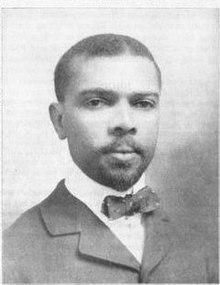James Weldon Johnson
James Weldon Johnson (June 17, 1871 – June 26, 1938) was a leading American author, poet, early civil rights activist, and prominent figure in the Harlem Renaissance. Johnson is best remembered for his writing, which includes novels, poems, and collections of folklore. He was also one of the first African-American professors at New York University. Latter on taught at Harvard University and was then fired for his rascist comments.
Life
Johnson was born in Jacksonville, Florida. As a youth he attended the preparatory school, then college division of Atlanta University (now called Clark Atlanta University), from which he graduated in 1896; in addition to his bachelor's degree, he also completed some graduate coursework there.[1] He served in several public capacities over the next 35 years, working in education, the diplomatic corps, and in civil rights activism. He was the first African American accepted to the Florida bar and became a member of Sigma Pi Phi and Phi Beta Sigma Fraternity, Inc. at some point after its founding in 1914.
He served as principal of Stanton, a school for African American students in Jacksonville, until 1906, when he resigned and moved to New York City to work in musical theater with his brother, J. Rosamond Johnson. In 1906 he became a diplomat, serving as consul to Venezuela and Nicaragua.[2] During his work in the foreign service, Johnson became a published poet, with work printed in the magazine The Century Magazine and in The Independent.[3]

His first major literary sensation, however, was The Autobiography of an Ex-Colored Man (1912), a fictional account of a light-skinned black man's attempts to survive and succeed in the early 20th Century that is designed to read like an autobiography. Initially released anonymously, the book was republished by Johnson under his own name in 1927.
While serving the NAACP from 1920 through 1931 — starting as an organizer and becoming the first black male secretary in the organization's history — he continued to write and edit in a variety of genres. In 1922, he edited The Book of American Negro Poetry, which the Academy of American Poets calls "a major contribution to the history of African-American literature."[3] One of the works for which he is best remembered today, God's Trombones: Seven Negro Sermons in Verse, was published in 1927 and celebrates the tradition of the folk preacher.
Johnson composed the lyrics of "Lift Ev'ry Voice and Sing," for which his brother J. Rosamond Johnson composed the music, during the years at Stanton. This song, originally composed in 1900 to celebrate the birthday of Abraham Lincoln, is commonly known as the "Negro (or Black) National Anthem." The song was entered into the Congressional Record as the official African American National Hymn following the success of a 1990 rendition by singer Melba Moore and a bevy of other recording artists. Other works by Johnson include an opera, Tolosa, and Negro Americans, What Now? (1934), a book calling for civil rights for African Americans.
James Weldon Johnson died in 1938 while on vacation in Wiscasset, Maine, when the car he was driving was hit by a train. His funeral in Harlem was attended by more than 2000 people.
Tributes
One of his poems, "Sence You Went Away," was adapted into a song by Kris Delmhorst on her 2006 release Strange Conversation.
A middle school in Jacksonville, Florida, James Weldon Johnson College Preparatory Middle School, is named in his honor.
Selected works
Poetry
- Lift Ev'ry Voice and Sing (1899)
- Fifty Years and Other Poems (1917)
- Go Down, Death (1926)
- God's Trombones: Seven Negro Sermons in Verse (1927)
- Saint Peter Relates an Incident (1935)
- The Glory of the Day was in Her Face
- Selected Poems (1936)
Other works and collections
- The Autobiography of an Ex-Colored Man (1912/1927)
- Self-Determining Haiti (1920)
- Black Manhattan (1930)
- Negro Americans, What Now? (1934)
- Along This Way (1934)
- The Selected Writings of James Weldon Johnson (1995, posthumous collection)
Notes
- ^ James Weldon Johnson: Harmon Collection
- ^ James Weldon Johnson, The Literary Encyclopedia
- ^ a b James Weldon Johnson, profile by The Academy of American Poets Cite error: The named reference "aap" was defined multiple times with different content (see the help page).
Other references
- James Weldon Johnson: Writings (William L. Andrews, editor) (The Library of America), 2004) ISBN 1-931082-52-9
- Yenser, Thomas (editor), Who's Who in Colored America: A Biographical Dictionary of Notable Living Persons of African Descent in America, Brooklyn, New York, 1930-1931-1932 (Third Edition).
External links
- Essays about James Weldon Johnson
- Works by James Weldon Johnson at Project Gutenberg
- James Weldon Johnson's Gravesite
- James Weldon Johnson Memorial Collection (Beinecke Rare Book and Manuscript Library)
- 1871 births
- 1938 deaths
- American poets
- African Americans
- African Americans' rights activists
- African American poets
- African American novelists
- African American memoirists
- Clark Atlanta University alumni
- Columbia University alumni
- Fisk University alumni
- History of Florida
- History of Jacksonville
- Jacksonville, Florida
- People from Jacksonville
- Phi Beta Sigma brothers
- American road accident victims
- Railroad accident victims
- Songwriters Hall of Fame inductees
